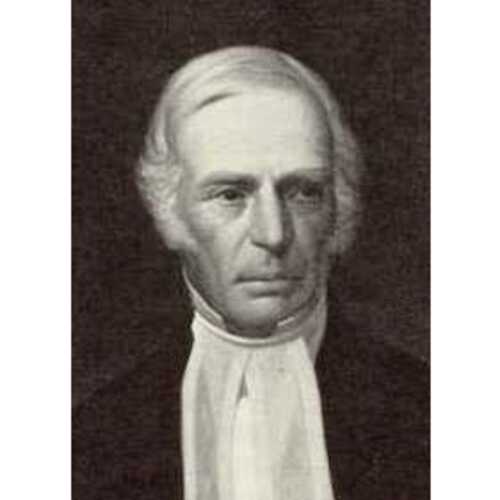![[photo of John Machar]; John Machar Original title: [photo of John Machar]; John Machar](/bioimages/w600.3952.jpg)
Source: Link
MACHAR (Machir), JOHN, Presbyterian clergyman and educator; baptized on 18 Dec. 1796 at Tannadice, Forfarshire (Angus), Scotland, youngest of the nine children of David Machir, a small farmer, and Jean Walker; d. 7 Feb. 1863 at Kingston, Canada West.
John Machar’s mother had been educated by her father, a classical scholar driven into obscurity through his attachment to the Young Pretender, Charles Edward. Her unusually strong traditions of piety and culture deeply influenced her son. He attended a local school at Tannadice and the grammar school at Brechin, then entered King’s College, Aberdeen, where he obtained the degree of ma in 1814. Before being licensed to preach by the Church of Scotland in October 1819 he taught in a school at Inverurie, Aberdeenshire, acted as tutor in private families, and attended two sessions at the University of Edinburgh. While waiting for a permanent appointment he assisted in a number of parishes, including those of Brechin and Logie, and again tutored.
In 1826 the elders of St Andrew’s Church at Kingston requested the Edinburgh Presbytery to nominate a minister to succeed the Reverend John Barclay. Machar was chosen and reached Kingston by way of New York early in September 1827. From then until his death he was honoured for his untiring pastoral work which was not confined to Kingston but extended to many surrounding districts then without regular church services. Despite poor health, partly the result of a severe attack of rheumatic fever in 1831, he also worked among the immigrants who passed through Kingston travelling west, many of whom became victims of the prevailing cholera epidemics.
In 1831 Machar was one of 14 ministers of the Church of Scotland who, along with five representative elders met at Kingston to establish the first Synod of the Presbyterian Church in Upper Canada. John Mackenzie* was elected first moderator in 1831; Machar became moderator in 1833. Machar was also secretary of the Religious Tract Society and of the Kingston Bible Society, a promoter of Sabbath schools, and a Presbyterian chaplain to the army in Kingston. In a period of rather bitter religious controversy he was notable for his friendly co-operation with clergymen of other denominations, particularly with his neighbour, the Reverend R. D. Cartwright of the Church of England. Together they worked to endow day schools in the Midland District for the benefit of those who could not afford the usual fees.
Machar was by taste a pastor and a scholar finding his recreation in his own unusually fine library. He is chiefly remembered, however, for the part he played in founding and fostering Queen’s College at Kingston. He was among the 12 clergymen and 15 laymen named in the charter as the first board of trustees. One of the few who lived in Kingston and who could attend meetings regularly he was for over 20 years closely concerned with the management of the college and of its auxiliary school. For a number of years he conducted the classes in Hebrew. In 1846, as a result of the division of the church in Canada in 1844 following the “great disruption” of 1843 in Scotland, and of the failure to secure for Queen’s a share in the King’s College endowment, some thought that the college should be closed. It was then, at the request of the trustees, that Machar, while remaining pastor of St Andrew’s, accepted the temporary position of principal of Queen’s, in succession to Thomas Liddell*. The University of Glasgow accorded him the customary honour of the dd in the following year. He carried on until 1852 with a temporary, part-time, and constantly changing staff. He asked for no regular salary, and returned, in the form of bursaries, substantial portions of the honoraria voted by the board; the rest he devoted to paying off the debt on St Andrew’s Church. The only tangible profit of these years to him was the magnificent folio edition of Walton’s “Polyglot Bible” which now forms a part of the distinguished collection of bibles in Queen’s University library.
Machar resigned as principal in 1852 but continued to serve until 1853 when he was at last allowed to retire in favour of the Reverend James George. He left Queen’s in what may be termed a typical situation of precarious security. He continued to act as trustee until his death in 1863, and in 1855–57 he again took charge of the Hebrew classes. He had married in 1832, but the name of his wife is not known. His daughter, Agnes Maule Machar*, who was known as a writer of verse and short stories, published a brief biography of Machar in 1873. His son, John, a graduate of Queen’s, practised as a lawyer in Kingston and was a member of the faculty of the abortive college of law at Queen’s in 1880.
QUA, Queen’s records, B; D1, 1840–63. [A. M. Machar], Memorials of the life and ministry of the Reverend John Machar, D.D., late minister of St. Andrew’s Church, Kingston, (Toronto, 1873). Presbyterian (Montreal), XXVI (1873), 283.
Cite This Article
Hilda Neatby, “MACHAR (Machir), JOHN,” in Dictionary of Canadian Biography, vol. 9, University of Toronto/Université Laval, 2003–, accessed April 2, 2025, https://www.biographi.ca/en/bio/machar_john_9E.html.
The citation above shows the format for footnotes and endnotes according to the Chicago manual of style (16th edition). Information to be used in other citation formats:
| Permalink: | https://www.biographi.ca/en/bio/machar_john_9E.html |
| Author of Article: | Hilda Neatby |
| Title of Article: | MACHAR (Machir), JOHN |
| Publication Name: | Dictionary of Canadian Biography, vol. 9 |
| Publisher: | University of Toronto/Université Laval |
| Year of revision: | 1976 |
| Access Date: | April 2, 2025 |



